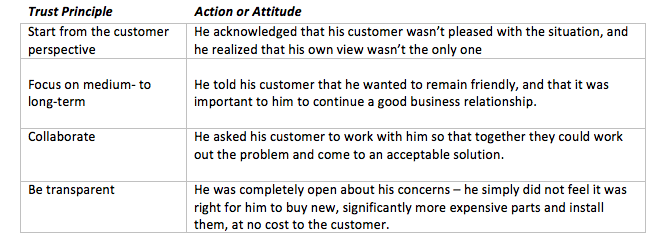25 Warning Signs You Have a Low-Trust Organization: Part 5 of 5
If your customers and clients tell you they don’t trust you, things have gotten bad. But you could have seen it coming. There were many early-warning signs of low trust in your organization.
This is the last in a series of five. The other posts address warning signs of low-trust organizations coming from:
- Employees
- Teams
- Leadership
- Products and Services
- Clients and Customers (this blogpost)
How Your Clients and Customers Tell You You’re Low-Trust
It’s almost inconceivable that a high-trust organization will have low-trust relationships with its clients or customers. And that works in reverse: low-trust buyer relationships are a tip-off that something is amiss internally as well. Sometimes it’s easier to read the external signals, so here they are:
1. Your colleagues speak disparagingly of your customers.
- “They’re trying to pull a fast one on us; we can’t let them get away with it.” Whoa, simmer down. People who ascribe negative motives to customers’ actions without data, will generally do the same within the organization. With all due respect to Andy Grove, paranoia is rarely a good corporate value to promote.
- “I’ll believe it when I get it in writing.” If your people insist on contractual, legalistic relationships with customers, they’ll do the same internally. And since trust greatly reduces time and costs, that attitude is costing you dearly, internally as well as externally.
2. You haven’t gotten a new referral client in 6 months.
- This is such a key concept that it has been quantitatively refined (brilliantly) in the Net Promoter Score first developed by Bain’s Reichheld and Markey. At its heart: the single metric that best correlates with success is your clients’ tendency to promote you.
- If you have great referrals, you almost certainly have delighted customers and energized employees. And that rarely happens without great levels of trust within the organization.
3. You’re losing customers and don’t really know why.
- Look at your customer list: is it basically growing or shrinking? Come on, you know the answer, pick one.
- Now ask yourself: do I really know why that is? Or do I have a list of anecdotal, seemingly unrelated reasons? The CEO left; that guy’s a complete jerk; they decided to go with the low-price provider; they’re rationalizing suppliers.
- That is not an unrelated list, after all. The common denominator is, they don’t trust you. And if your customers don’t trust you, the odds are remote that you live in a high-trust organization.
4. You’re being asked to submit bids and respond to RFPs for long-time clients.
- We don’t want to be dogmatic about this one: there is a long-term, secular trend toward professional procurement. That trend is not Evil incarnate; the procurement people are your new clients. Treat them as such, respectfully.
- However: if YourCo seems to be singled out for this treatment, if it’s not a slow trend but a landslide for you, then maybe the market is telling you something. It’s telling you you’re not trusted. If you were trusted, you’d be seeing many fewer RFPs, you’d be getting sole-sourced where reasonable, you’d be getting in to define some RFPs, and you’d be getting some very personal coaching from the customer about how to operate in the new procurement world.
- That’s not happening? Then odds are, your customers don’t trust you. They’ve never been shown the difference between genuine concern and manipulation. They’d prefer to deal at arms-length, with professional buyers who are immune to emotional bullying and enticement alike. They prefer to deal on price, because they haven’t been shown any good reason to deal on any other basis.
- And if you’re quoting on price, using self-oriented sales tactics with your customers, then you probably don’t respect your own products, value and organization. Sounds like low-trust.
We hope you’ve enjoyed this little series on warning signs of a low-trust organization. Writing it has reminded us of two things:
1. Trust is infectious. A high-trust organization is highly correlated with high performance on so many dimensions: innovation, people, leadership, products, and markets.
2. Trust begins at home. Correlation is not causality, but causality is clearly at work in trust. Furthermore, it flows more in certain ways than in others. In very broad terms, the five factors we’ve discussed move in the following manner to create a high-trust organization.
It generally starts with leadership; but that’s a different series for another time.


 Charles Ferguson, the Oscar Winning director of
Charles Ferguson, the Oscar Winning director of  The first tranche of the
The first tranche of the 
 This is one of my all-time favorite stories. Three umpires (baseball, for our international readers) were talking about how they make calls on each pitch.
This is one of my all-time favorite stories. Three umpires (baseball, for our international readers) were talking about how they make calls on each pitch.